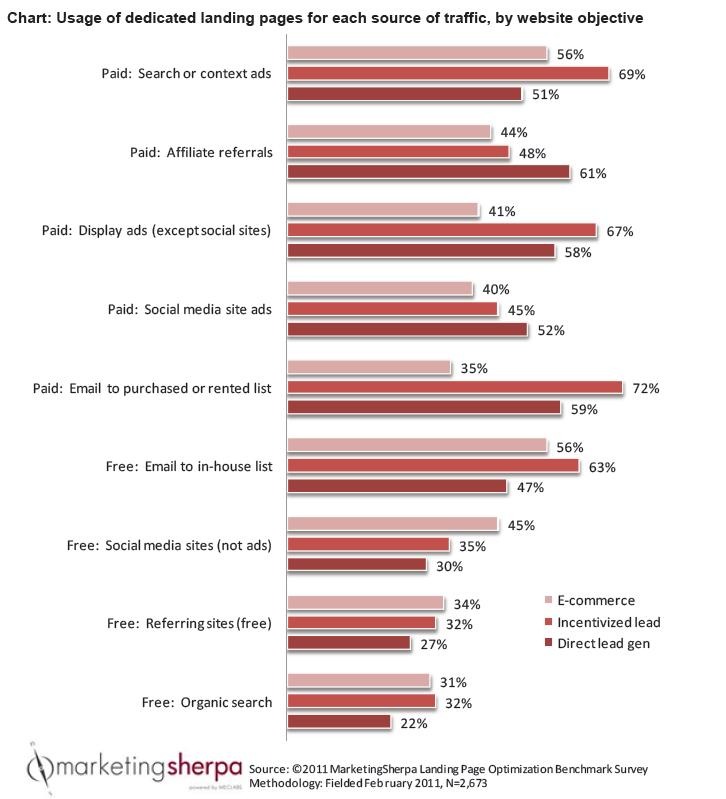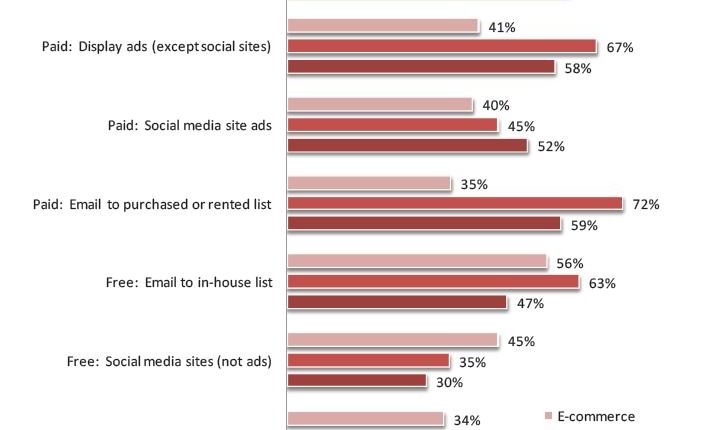If you’ve been reading this blog for just about any amount of time, you already know that landing page optimization is an effective way to increase the ROI of your website traffic.
But when most people think of landing pages, they think of pages tied to certain traffic sources. The most popular of those sources are generally PPC ads and email messaging.
But there are a few other opportunities to capitalize on your traffic with landing pages. Take a look at this marketing research chart from Boris Grinkot’s 2011 MarketingSherpa Landing Page Optimization Benchmark Report:

According to the chart, most marketers aren’t optimizing traffic from:
- Social media sites
- Referring sites
- Organic search
Now right off the bat, you might be thinking that the reason those traffic sources aren’t capitalized on has to do with the fact that most websites aren’t getting traffic from those sources.
However, this data only factors in marketers who have traffic from these sources.
So for example, of the E-Commerce sites that are currently receiving organic search traffic, only 31% of them are capitalizing on it with dedicated landing pages.
The fact that some marketers are dedicating landing pages to these particular sources of traffic is a good indicator that they are working to convert that traffic, but that most marketers are simply missing out.
This one chart signals that there is a tremendous opportunity to get ahead of your competition and start capitalizing on more of your traffic.
Get 41 more charts like this one…FREE
This is simply one insight from one chart in the Benchmark Report. If you really wanted to, I’m sure you could get a lot more out of this chart. You’re only limited by your own business intelligence.
For the next few days, the entire chapter from the Benchmark Report this chart is in can be downloaded for free thanks to a generous sponsorship from HubSpot. All you need to do to get your 41 free charts including Boris’ insightful analysis is click the link below, fill out the form on the landing page, and download the chapter.




Surprising data. I work mostly with nonprofits and small businesses, but in my experience the emphasis is on organic search, referring sites, and social media sites BEFORE paid advertising.
@Karen Luttrell
Yes. I would think most of the participants for this survey were from mid- to large-sized for-profit corporations. It would be interesting to see the results from a similar survey aimed at NPO’s and SMB’s. Thanks for the comment, Karen.
I’d guess some of the reason the sites don’t have dedicated landing pages for things like referring sites or organic search is that it’s a bit more tricky.
Referring sites link to a specific page because of the content on it (for example, a link from a high profile blogger to an article you’ve written). Suddenly removing the content and replacing it with a landing page wouldn’t go down to well – you’d probably lose the link if the blogger found at, and lose a bunch of good will.
From social sites, twitter users are notorious for hating going to lead capture pages. They follow links to articles, news, videos etc. But they bounce very quick if they go to a lead capture page.
And with organic search, apart from the fact than very many searches end up on the home page, the searchers are again looking for specific content. Change the page too much and you may well lose your search ranking – and visitors may bounce because they’re not getting what they were looking for.
Now it’s not black and white. I bet most people could do more to add elements of lead capture or other landing page components. For example, a prominent information or optin box specific to the content on the page for referral or high traffic search destinations. For social media, your profile page link on twitter could go to a lead capture page.
So definitely things that could be done for these traffic sources that improve the results when they hit your site by making them more landing-page-like.
But your survey didn’t ask that – it asked if they had dedicated landing pages. Going the whole hog to landing pages for these sorts of traffic sources is not as simple as doing it for ads or emails – and that’s probably why the results are the way they are.
Ian
Ian has a fair perspective. In our experience — and we work with all 3 client groups – NPO, SMB, med/lrg corps — social, referral links, and organic results are typically aimed at the company’s “home page” or an interior content page.
Those traffic sources are intended to be used that way, at least in this online environment where a “sales pitch” is differentiated from a “business site” — sort of like the difference between reading a sales letter you get in the mail versus going to a retail store to shop around.
And, for search results in particular, traffic drop dramatically if landing page attributes like “lead capture” forms are added. With many organic search algorithms, reciprocal link pages and link farms have been ignored or banned based on recent changes in internal calculations.
For social, we often hear that “likes” or fan base increases occur but it is then difficult to get those people out of the social box into the business’ real website.
These are extremely interesting results, and we would agree that most businesses and online marketing professionals are not making good use of social, referrals and organic sources of traffic. However, if you want to “sell” something I think the message is clear on what works.
If you want to grow your business, get more visitors, build up your repeat customer base, the marketing fundamentals still apply. Decide what your objectives are, where your customers are, then go there to get them.
Thanks for this post, very informative stuff.
DA
What a great post and brilliant comments. I have been studying resources for the past year in formulating free traffic to sites, but yep noticed the conversions were low and I saw the comment on Twitter and Lead Captures. Well something to learn from. Dale you are right if you have set up a business you need to get the visitors/customers.
> of the E-Commerce sites that are currently receiving organic search
> traffic, only 31% of them are capitalizing on it with dedicated
> landing pages.
Dedicated to what search phrase(s)? Sounds like this implies you’d need a variety of landing pages for different key phrases. Seems like those would be the same landing pages as for the corresponding pay-per-click key phrases you advertise.
Watch out if you have too many similar pages — Google could be consider this to be a version of the old “doorway pages” tactic which could draw a penalty for search engine spamming.